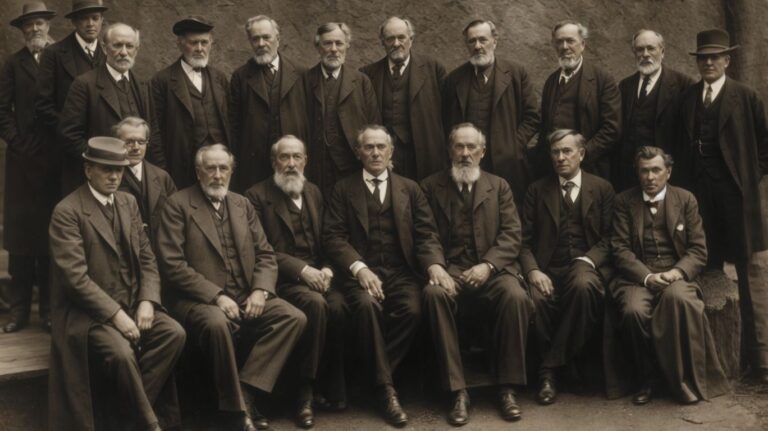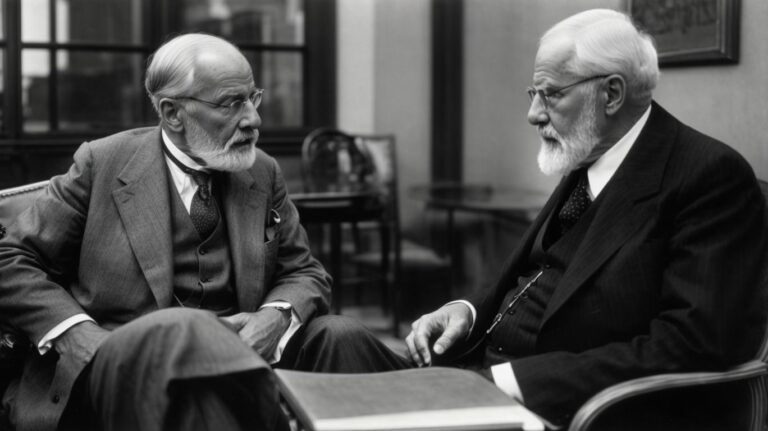Have you ever wondered about the depths of the human psyche and the mysteries it holds? In this comprehensive article, we will explore the fascinating world of Depth Psychology. From its definition and origins to key figures and core concepts, we will delve into the unconscious mind, archetypes, shadow, and individuation.
Discover the different approaches in Depth Psychology, including Freudian Psychoanalysis and Jungian Analytical Psychology. Explore how Depth Psychology is applied in therapy, and learn about the criticisms it faces. Join us on this journey into the depths of the human mind.
Contents
- 1 What Is Depth Psychology?
- 2 What Are the Core Concepts of Depth Psychology?
- 3 What Are the Different Approaches in Depth Psychology?
- 4 How Is Depth Psychology Applied in Therapy?
- 5 What Are the Criticisms of Depth Psychology?
- 6 Frequently Asked Questions
- 6.1 What is depth psychology?
- 6.2 What are the main principles of depth psychology?
- 6.3 How does depth psychology differ from traditional psychology?
- 6.4 What are some common techniques used in depth psychology?
- 6.5 What are the practical applications of depth psychology?
- 6.6 Is depth psychology considered a valid approach in modern psychology?
What Is Depth Psychology?
Depth psychology delves into the exploration of the unconscious mind and the interplay of psychological forces that shape human behavior and experiences, drawing upon the foundational works of prominent figures such as Sigmund Freud and Carl Gustav Jung.
Freud, the father of psychoanalysis, introduced the concept of the unconscious mind as a reservoir of repressed thoughts and emotions influencing conscious behaviors.
Jung, a disciple of Freud, expanded on these ideas by focusing on archetypes and the collective unconscious as universal psychological patterns.
These pioneering thinkers laid the groundwork for depth psychology, which emphasizes the importance of understanding unconscious processes in therapy and personal growth.
Definition of Depth Psychology
Depth psychology can be defined as a psychological approach that explores the hidden aspects of the human psyche, emphasizing the significance of the unconscious mind, psychological types, and the intricate dynamics that influence human behavior.
This branch of psychology delves into the unconscious mind, where repressed thoughts, memories, and desires reside, often shaping an individual’s actions without their conscious awareness. By analyzing these hidden layers of the mind, depth psychology seeks to uncover the roots of behaviors, patterns, and motivations that may not be readily apparent in everyday interactions.
Depth psychology places a strong emphasis on psychological types, recognizing the complexities of human personalities and the diverse ways individuals perceive and interact with the world. Through the exploration of these types, psychologists gain insight into how different individuals process information, make decisions, and navigate their inner worlds.
By integrating the understanding of the unconscious mind and psychological types, depth psychology offers a rich framework for comprehending the intricate dynamics that drive human behavior, paving the way for a more holistic and nuanced perspective on individual experiences and actions.
Origins of Depth Psychology
The origins of depth psychology trace back to the pioneering works of Sigmund Freud and Carl Gustav Jung, who revolutionized the field by introducing concepts such as the unconscious mind, dream analysis, and the intricate mechanisms of human psyche.
Freud, often referred to as the father of psychoanalysis, delved into the depths of human behavior, unraveling the hidden motives and desires that influence our conscious thoughts and actions. His groundbreaking psychoanalytic methods, like free association and transference, paved the way for a deeper understanding of the human mind’s complexities.
Jung, a disciple turned colleague of Freud, took a different path by expanding Freud’s ideas and introducing his concept of the collective unconscious and archetypes. Jung’s emphasis on individuation, the process of integrating aspects of the unconscious into conscious awareness, brought a spiritual dimension to psychology.
Key Figures in Depth Psychology
Key figures in the realm of depth psychology include Sigmund Freud and Carl Gustav Jung, whose groundbreaking theories and therapeutic approaches reshaped the landscape of psychotherapy, dream analysis, and the understanding of the unconscious mind.
Freud’s pioneering work delved deep into the complexities of the human psyche, introducing concepts such as the id, ego, and superego that revolutionized our understanding of personality dynamics. His psychoanalytic approach, emphasizing the role of early childhood experiences and the unconscious mind, paved the way for modern psychotherapy.
Jung, on the other hand, expanded upon Freud’s theories by introducing the concept of the collective unconscious and archetypes, highlighting the universal symbols and myths that transcend individual experiences.
What Are the Core Concepts of Depth Psychology?
The core tenets of depth psychology encompass intricate concepts such as archetypes, the shadow self, individuation, and the collective unconscious, providing a framework for understanding the underlying dynamics of human behavior and personal growth.
Archetypes in depth psychology refer to universal symbols and patterns residing in the collective unconscious, shaping perceptions and behaviors across cultures. The shadow self reflects the hidden, suppressed aspects of one’s personality, often projected onto others or causing internal conflicts. Individuation, a central process, involves integrating the unconscious aspects with the conscious self, leading to a more authentic and balanced existence. The concept of the collective unconscious suggests a shared reservoir of ancestral experiences and wisdom that influences individual development and societal dynamics.
Unconscious Mind
The concept of the unconscious mind in depth psychology, as elucidated by Freud and Jung, reveals the hidden realm of thoughts, desires, and memories that influence human behavior and shape the complexities of the psyche.
In depth psychology, the unconscious mind is seen as a reservoir of repressed emotions, traumatic experiences, and unresolved conflicts that exert a powerful influence over an individual’s conscious thoughts and actions. Sigmund Freud famously introduced the idea of the unconscious as the repository of hidden desires and instincts that drive behavior, while Carl Jung expanded on this concept, emphasizing the collective unconscious and the archetypes that shape human experiences.
Archetypes
Archetypes, as conceptualized by Carl Gustav Jung within depth psychology, represent universal symbols and themes embedded in the collective unconscious, shaping individuals’ experiences, behaviors, and perception of the world.
Jung’s theory of collective unconscious posits that archetypes are innate, symbolic patterns inherited from our ancestors, transcending cultural boundaries and time periods. These archetypes serve as the building blocks of the human psyche, influencing not only individual behaviors but also cultural narratives and societal constructs.
Through archetypes, individuals can connect with universal themes such as the Hero, the Shadow, the Wise Old Man, and the Mother, allowing them to tap into a deeper understanding of themselves and the world around them. The symbolic aspects of the psyche, deeply intertwined with archetypes, play a crucial role in the interpretation of dreams, myths, and artistic expressions.
Shadow
In depth psychology, the shadow represents the repressed, hidden aspects of an individual’s personality residing in the unconscious mind, often manifesting through projections and unresolved conflicts.
These suppressed elements encompass traits, desires, or emotions that are considered unacceptable or unfavorable by the conscious self. Carl Jung identified the shadow as a crucial part of one’s psyche, which, if left unacknowledged, can lead to destructive behaviors and hinder personal development. Shadow work, a process involving self-reflection and introspection, involves confronting and integrating these obscured facets to achieve wholeness and authenticity. By looking into the shadow, individuals can gain insight into their motivations, enhance self-awareness, and cultivate healthier relationships with themselves and others.
Individuation
Individuation, a central concept in depth psychology proposed by Carl Gustav Jung, refers to the process of integrating disparate aspects of the self, engaging with archetypes, and achieving a harmonious, authentic sense of identity.
This transformative journey towards personal wholeness involves looking into the unconscious, confronting the shadow side, and acknowledging the existence of both the persona and the anima/animus. The individuation process entails exploring one’s inner world, dreams, and symbols to uncover hidden truths and foster spiritual growth. By embracing self-realization through introspection and self-reflection, individuals can transcend limitations, heal psychological wounds, and cultivate a deeper understanding of themselves and their place in the world.
What Are the Different Approaches in Depth Psychology?
Various approaches within depth psychology, such as Freudian Psychoanalysis, Jungian Analytical Psychology, Adlerian Individual Psychology, and Object Relations Theory, offer distinct perspectives on the unconscious mind, human behavior, and therapeutic practices.
Freudian Psychoanalysis, pioneered by Sigmund Freud, delves into the influence of the unconscious mind, childhood experiences, and defense mechanisms on behavior.
In contrast, Jungian Analytical Psychology, developed by Carl Jung, focuses on individuation, archetypes, and the collective unconscious.
Adlerian Individual Psychology, founded by Alfred Adler, emphasizes social interest, inferiority feelings, and the pursuit of superiority.
Moreover, Object Relations Theory examines how early relationships shape one’s self-concept and interpersonal dynamics.
Freudian Psychoanalysis
Freudian Psychoanalysis, pioneered by Sigmund Freud, delves into the exploration of the unconscious mind, the interpretation of dreams, and the resolution of repressed memories and conflicts to uncover hidden psychological truths.
Freud’s method of dream analysis, known as the ‘royal road to the unconscious,’ involved interpreting dreams as manifestations of unconscious desires and conflicts.
He believed that dreams provided a glimpse into the unconscious mind, revealing deep-seated fears, desires, and unresolved issues that influence behaviors and emotions.
The significance of the unconscious in shaping behaviors is central to Freudian theory, as it suggests that much of what drives human actions lies beneath the surface of conscious awareness.
Therapeutic techniques in Freudian Psychoanalysis, such as free association and transference, aim to bring unconscious thoughts and feelings into conscious awareness to facilitate healing and transformation.
Jungian Analytical Psychology
Jungian Analytical Psychology, developed by Carl Gustav Jung, emphasizes the exploration of archetypes, the integration of the shadow self, and the individuation process as pathways to self-discovery, inner harmony, and psychological growth.
Through his work, Jung delved deeply into the collective unconscious, positing that archetypes are universal symbols that shape human experiences and behaviors.
The shadow self, a concept central to Jungian psychology, represents the repressed or unconscious aspects of an individual that are often viewed as negative or undesirable.
By confronting and integrating the shadow, individuals can achieve a more balanced psyche and embrace their wholeness, leading to profound personal transformation.
Adlerian Individual Psychology
Adlerian Individual Psychology, founded by Alfred Adler, focuses on the development of a healthy self-concept, social interest, and the pursuit of meaningful goals as essential components of psychological well-being and personal growth.
In Adlerian Individual Psychology, self-concept is viewed as the foundation upon which all other psychological traits are built. Adler emphasized the significance of individuals’ social interest, highlighting the interconnectedness between personal well-being and the well-being of society as a whole. Through fostering a sense of community and encouraging individuals to contribute positively to their social environment, Adler believed that individuals could achieve a higher level of psychological resilience.
Object Relations Theory
Object Relations Theory, a branch of depth psychology, explores the impact of early relationships and psychological attachments on individuals’ emotional development, interpersonal dynamics, and self-perception.
This theory suggests that the quality of one’s early relationships with primary caregivers shapes the internal representations of self and others, known as ‘internal objects.’ These internal objects influence how an individual perceives and relates to themselves and others throughout life. Understanding these early relational patterns can offer valuable insights into recurring emotional struggles, attachment styles, and relationship dynamics in adulthood.
How Is Depth Psychology Applied in Therapy?
Depth psychology is applied in therapeutic settings through a variety of techniques such as dream analysis, active imagination, and exploration of the personal and collective unconscious, fostering self-awareness, psychological healing, and individuation.
This approach delves into the depths of the human psyche, allowing individuals to uncover hidden motives, desires, and unresolved conflicts that impact their thoughts and behaviors. By interpreting dreams, therapists can decipher symbols and themes that reveal unconscious aspects of a person’s inner world, providing valuable insights for personal growth.
- Active imagination, as developed by Carl Jung, encourages clients to engage in dialogues with their inner selves, archetypal figures, and symbolic representations, facilitating a deeper understanding of their unconscious dynamics.
- Through the exploration of unconscious processes, individuals can access buried emotions, memories, and traumas, leading to cathartic experiences and emotional release that pave the way for healing and transformation.
- Case studies have shown how depth psychological practices have helped clients resolve deep-seated issues, develop a stronger sense of self, and cultivate a more authentic way of being in the world.
Techniques Used in Depth Psychology Therapy
Therapeutic interventions in depth psychology encompass a range of techniques, including dream analysis, active imagination, and the exploration of symbolic imagery to access and integrate unconscious material, promote self-discovery, and facilitate psychological growth.
Dream analysis, a fundamental tool in depth psychology, involves the interpretation of dreams to unravel hidden meanings and subconscious messages that can shed light on unresolved issues and underlying emotional conflicts. Through exploring dreams, individuals can gain insights into their psyche, fears, desires, and unresolved emotions.
Active imagination, another pivotal technique, encourages individuals to engage in a dialogue with their unconscious mind by actively participating in the imagery and symbols that arise, allowing for a deeper understanding of the inner world and facilitating integration of conflicting aspects of the self.
Case Studies and Examples of Depth Psychology Therapy
Case studies and clinical examples in depth psychology therapy, often featured in PsyD degree programs, provide insights into the application of theoretical concepts, therapeutic techniques, and the transformative impact of depth psychological interventions.
These case studies showcase the profound changes that clients undergo as they delve into their unconscious depths through therapy. For instance, one real-world example involves a client who, through exploring childhood trauma with a depth psychologist, gained a new understanding of their behavior patterns and was able to make significant shifts towards healthier relationships. Such narratives highlight the practical efficacy of depth psychological approaches, reinforcing the value of integrating theoretical learning with experiential practice in clinical settings.
What Are the Criticisms of Depth Psychology?
Critiques of depth psychology often revolve around the perceived lack of concrete scientific evidence supporting its theories, concerns about potential manipulation through interpretations of the unconscious mind, and debates on the overemphasis of hidden psychological forces in therapeutic practices.
One of the primary criticisms directed towards depth psychology is the challenge to translate its concepts into measurable, empirical data that can withstand the scrutiny of traditional scientific methods. Critics argue that the subjective nature of the unconscious realm can lead to interpretations that lack objectivity and reliability, thus questioning the validity of therapeutic interventions based on these principles. Ethical dilemmas surface as therapists delve into interpreting elusive unconscious material, potentially shaping clients’ narratives in ways that may not align with reality or verifiable truths.
Lack of Scientific Evidence
One prevalent criticism of depth psychology pertains to the perceived lack of empirical evidence supporting its core tenets, leading to debates between proponents of Freudian and Jungian perspectives on the scientific legitimacy of unconscious processes and therapeutic outcomes.
While Freudians often emphasize the need for clinical observations and case studies to validate their theories, Jungians tend to argue for a more symbolic and archetypal approach that may not lend itself easily to conventional scientific methods.
This divergence in views underlines the ongoing tension within the field regarding the balance between empirical rigor and subjective interpretation, with some scholars highlighting the need for a more integrated approach that bridges the gap between empirical data and symbolic meaning in depth psychological practices.
Overemphasis on the Unconscious Mind
Critics argue that depth psychology’s emphasis on the unconscious mind may lead to potential biases, misinterpretations, and the risk of manipulating individuals through subjective interpretations of hidden psychological processes, raising ethical concerns about the therapeutic applications of unconscious-focused approaches.
One of the primary criticisms of this approach is the concern regarding the subjective nature of interpreting unconscious motives and memories. Critics suggest that therapists, despite their training, may inadvertently project their own biases onto the interpretation of clients’ unconscious material, leading to potential misinterpretations.
There is apprehension about the therapeutic relationship being compromised by the power dynamics inherent in looking into hidden psychological realms. Critics caution that the authority granted to therapists in uncovering and analyzing unconscious content can skew the balance of power, possibly leading to the manipulation of vulnerable individuals.
These concerns underscore the importance of implementing safeguards and ethical guidelines to ensure that depth psychology interventions are conducted responsibly and with full awareness of the potential risks inherent in exploring the unconscious mind.
Potential for Misuse and Manipulation
Another criticism of depth psychology revolves around the potential for misuse and manipulation in psychotherapeutic settings, where interpretations of unconscious content could inadvertently influence clients, raise false memories, or perpetuate harmful beliefs, necessitating ethical vigilance and critical reflection.
One key concern in depth psychology practices is the delicate balance between looking into the unconscious mind and ensuring the well-being and autonomy of the client.
Without a firm ethical foundation, there is a risk of therapists imposing their interpretations onto clients, potentially distorting the therapeutic process and leading to unintended consequences.
Therefore, adherence to ethical standards is paramount in guiding therapists in responsibly applying unconscious-focused techniques, protecting the integrity of the therapeutic relationship and fostering genuine healing.
Frequently Asked Questions
What is depth psychology?
Depth psychology is a branch of psychology that focuses on exploring the unconscious mind and its influence on behavior, thoughts, and emotions. It is based on the theories of Sigmund Freud and Carl Jung.
What are the main principles of depth psychology?
The main principles of depth psychology include the belief that the unconscious mind plays a significant role in shaping human behavior, the importance of exploring past experiences and childhood traumas, and the concept of the collective unconscious.
How does depth psychology differ from traditional psychology?
Traditional psychology tends to focus on the conscious mind and observable behaviors, while depth psychology delves into the unconscious and explores underlying motivations and experiences that may not be readily apparent.
What are some common techniques used in depth psychology?
Some common techniques used in depth psychology include dream analysis, free association, and exploring personal myths and archetypes. These techniques aim to uncover unconscious thoughts, feelings, and patterns.
What are the practical applications of depth psychology?
Depth psychology has been applied in various fields, such as therapy, education, and business. It can help individuals gain self-awareness, overcome psychological issues, and understand the deeper meaning behind their thoughts and behaviors.
Is depth psychology considered a valid approach in modern psychology?
While it may not be the dominant approach in psychology, depth psychology continues to be studied and applied by many professionals in the field. Its principles and techniques have also influenced other psychological theories and practices.




